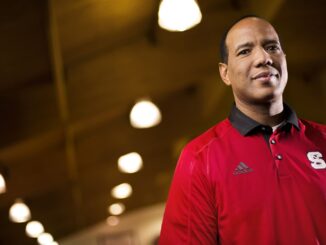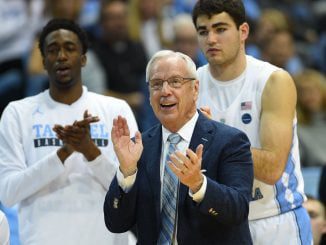
One of retired North Carolina basketball coach Roy Williams’ favorite sayings is that everything always looks better when the ball goes through the basket.
It’s an adage to which both his former team and rival NC State can relate.
Although their strengths and weaknesses are different, as is the makeup of their rosters, the Tar Heels and Wolfpack share a common denominator when it comes to the source of their ups and downs this season.
Their chances for success usually hinge on how often they see the ball go through the basket.
UNC is shooting 48.3% overall and 41.1% from 3-point range while averaging 80.7 points per game in its 13 wins, including Monday’s bounce-back victory against Virginia Tech at Smith Center. In its six losses, including its back-to-back blowouts at the hands of Miami and Wake Forest last week, those numbers go down to 40.3% and 29.7%, leading to a nine-point dip in scoring.
It’s a similar story for State, which was shooting 45.8% overall and 36.6% from beyond the arc in its 10 wins compared to just 39.7% and 31.6% in its 10 losses, with an eight-point difference in scoring output heading into Wednesday’s game at Notre Dame.
Given those trends, it figures that the team with the hotter hand will be the one that prevails when the Wolfpack and Tar Heels meet in Chapel Hill on Saturday for the first of their two regular season matchups.
According to State guard Casey Morsell, the key to his team’s shooting success is ball movement in the halfcourt offense.
“We want to get a lot of shots that are in rhythm, a lot of shots where the ball is moving and everybody has a flow with the game,” the Virginia transfer said after Saturday’s 77-63 win against his former team at PNC Arena.
“We shoot our lowest percentage when the ball is stuck to one person and nobody is really moving or getting involved. (Our emphasis is) to make sure we got great shots. We trust and believe in the work that everybody puts in that shots will fall.”
Morsell’s resurgence following an early-season ankle injury has added an extra element to a perimeter game that has been the Wolfpack’s primary source of offense in the absence of its only experienced low post threat, Manny Bates.
While do-it-all wing Dereon Seabron has been consistent in getting to the rim off the dribble and scoring off the offensive glass, the difference between victory and defeat usually hinges on the shooting performances of senior Jericole Hellems and freshman Terquavion Smith.
Smith’s percentage, in particular, has been a barometer for better or worse. Similarly, Caleb Love has been something of a measuring stick for the Tar Heels.
In UNC’s 13 wins, the sophomore guard is shooting 47.1% from 3-point range while averaging 16.7 points per game, second on the team behind big man Armando Bacot. In the six losses, he’s made only 29.0% of his long-range attempts while averaging just 11.2 points, fourth on the team.
Like State, the difference between the two extremes is the type of shots Love is taking. He’s much more likely to get open looks at the basket, as will teammate RJ Davis, when the Tar Heels run their offense through Bacot inside rather than hoisting up a flurry of 3-pointers early in the shot clock.
It’s a problem that plagued the Tar Heels at Miami and Wake, but it seemed to be fixed Monday against Virginia Tech.
“Last week I just felt like we were dribbling a lot. There was a lot of one-on-one, a lot of ball screens. There was no movement, there was no spacing, there was no balance out there on the offensive end,” UNC coach Hubert Davis said. “So we started running sets where we had a lot of movement and it just gave us an opportunity to drive. And when we drove, we made the right play in finding guys out on the perimeter shooting threes.
“We were able to score in many different ways, but it really started with Armando establishing the post at the beginning of the game.”
Bacot, a prime candidate for ACC Player of the Year, will likely be a pivotal factor in Saturday’s game against the Wolfpack.
Because of its lack of experience in the middle without Bates, who is out for the season with a shoulder injury, State has had fits stopping opponents with strong, talented bigs. As a result, coach Kevin Keatts said his team’s ability to defend will have as much if not more of an impact on the outcome as the frequency with which it puts the ball in the basket.
“I think we’re always in a position when we’re scoring,” Keatts said. “But what separates us and what always puts us over the hump is whether we can get stops.”


